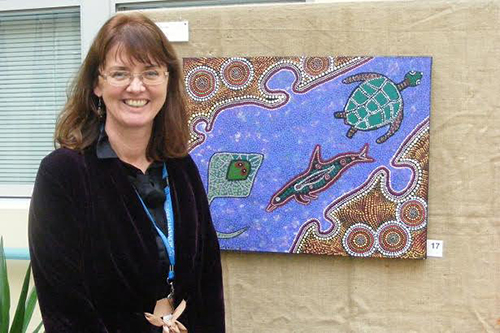The Occupational Therapy Curriculum (OTC) team has been awarded the Vice-Chancellor’s Spirit of Reconciliation Award for embedding First Peoples’ “knowing, being and doing” in the occupational therapy curriculum.
The Occupational Therapy Curriculum (OTC) team has been awarded the Vice-Chancellor’s Spirit of Reconciliation Award for embedding First Peoples’ “knowing, being and doing” in the occupational therapy curriculum.
The Spirit of Reconciliation Award has been introduced in 2020 as part of the Vice-Chancellor’s commitment to ACU’s Innovate Reconciliation Action Plan Aboriginal and Torres Strait Islander Peoples Employment Strategy (RAP). This award recognises the contributions of staff at ACU who strive to achieve culturally appropriate programs and activities for the betterment of our students and staff, and their commitment towards meeting the university’s Indigenous targets.
This year’s winning team comprises two groups. The first is led by Head of Discipline, Associate Professor Elspeth Froude, and Associate Professors Kerrie Thomsen, Loretta Sheppard and Laura Miller, along with Dr Susan Darzins, Dr Margaret Wallen and Hugh Stewart. The second group is the academic staff of the Contextual Determinants of Health Illness and Disability teaching team, Dr Elisa Yule, Dr Rosamund Harrington and Jennifer O’Brien.
Together, these staff have envisioned and delivered an occupational therapy curriculum that embeds First Peoples’ perspectives throughout the program.
“Our vision is that we want to have graduates who have begun their journey toward cultural responsiveness before they become qualified health professionals,” Loretta says.
“ACU Faculty of Health Sciences is a major contributor to the health professional workforce. There’s a responsibility to ensure our curriculum provides opportunities for students to develop cultural awareness before they graduate, so they are more ready to provide culturally responsive health services to the community.
“For a lot of students, it may be something they haven’t thought about. Our curriculum provides an opportunity for them to self-reflect and become more aware of the role they can play in the delivery of culturally appropriate health services to Aboriginal and Torres Strait Islander peoples.”
Changes to the Australian Occupational Therapy Competency Standards in 2018, and revised accreditation standards in 2020, have increased the expectation that occupational therapy graduates will practise in a culturally responsive way in all settings.
The appointment of Associate Professor Kerrie Thomsen, a proud Butchulla woman and occupational therapist, as the first Aboriginal and Torres Strait Islander Curriculum and Pedagogy Coordinator in the School of Allied Health was central in helping ACU meet these standards.
Kerrie has overseen the embedding of learning outcomes from each of the 17 cultural capability themes from the Aboriginal and Torres Strait Islander Health Curriculum Framework (HCF). In the process, she has engaged teaching teams of varying levels of readiness to explore the meaning of content in their units from the perspective of the health and wellbeing of First Peoples.
The occupational therapy team has built relationships with traditional owners and cultural leaders and fostered cultural mentors to support teaching and learning. They have brought together an outstanding team of cultural consultants to provide strong voices within the course review and accreditation process, and future curriculum planning.
Loretta says the team has asked their mentors where they think it’s important to have a First Peoples’ perspective and what this would look like in the course.
“Through our mentors, we connect with communities and local Indigenous health services as well to build our materials around case scenarios, and the lived experience of people with certain health conditions, to adapt our curriculum,” she says.
“We can’t do this work without governance and a two-way process of learning. We are a predominantly non-Indigenous academic group and, as we go along the pathway of embedding First Peoples’ knowledges into our curriculum, we’re on a journey of developing cultural responsiveness as well as our students.”
Adds Elspeth, “Having Kerrie on our team as an Aboriginal OT and academic really ensures that this work within our discipline at ACU is informed from her perspective, which is a key element.
“Having her support for us as non-Indigenous staff has been really important as well.”
In terms of how winning this award could pave the way for embedding knowledge in other disciplines in the future, both Loretta and Elspeth refer to the experience as being transformational.
“Any staff who have been involved in the process of embedding cultural perspective into our work have found it to be profoundly moving, both personally and professionally,” says Loretta. “Engaging with First Peoples’ health can be a transformational experience and we’ve wanted students to shift their thinking and connect prior knowledge to peoples’ lived experience.”
Elspeth acknowledges that it’s “exciting” to win in this new category. “It’s important the university shows recognition and value for work in this space and highlights the importance of this work.
“We want our students to shift the way they understand the world and what they take with them into practice, and we get very good feedback from the Student Evaluation of Learning and Teaching survey about the impact on student thinking which is overwhelmingly positive.”

Kerrie Thomsen – first Aboriginal and Torres Strait Islander Curriculum and Pedagogy Coordinator in the School of Allied Health and OTC Team mentor
Visit Service Central to access Corporate Services.